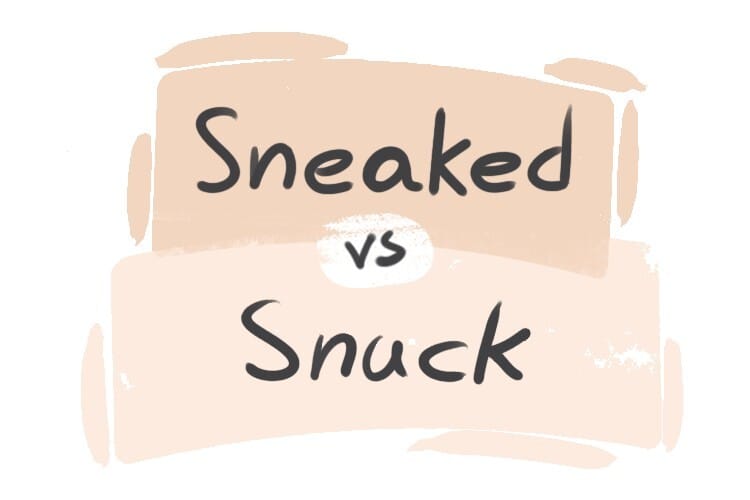Sneaked or Snuck: Understanding the Usage and Acceptability

Imagine you’re a professional storyteller. During a library session with children, you need to describe someone entering a room secretly. Should you say they "sneaked" in or "snuck" in? You hesitate and lose confidence, unsure which is correct
English can be challenging, especially for non-native speakers in India. The language has words like 'sneaked vs. snuck' that can create gaps in communication and cause misunderstandings if not understood properly.
This blog post will help you with practical tools, tips, and insights to understand 'sneaked vs snuck'. So let's get started.
The Puzzle of Sneaked and Snuck
The words 'sneaked' and 'snuck' can cause confusion and debates among English learners.
Originating from the verb 'sneak', both 'sneaked' and 'snuck' serve as its past tense. Interestingly, 'sneaked' is the original form, dating back to the late 16th century. In contrast, 'snuck' emerged in the United States around the 19th century. Today, both forms are widely accepted in English-speaking countries, with some regional preferences.
Consider this comparison table outlining their key similarities and differences:
Sneaked | Snuck |
Traditional form | American variant |
Preferred in written British English | Common in spoken American English |
Used worldwide | Becoming globally accepted |
Both words depict an action performed stealthily or without being noticed. For example, you might say "I sneaked/snuck into the kitchen for a midnight snack."
To learn about more such confusing words and phrases, explore Clapingo Blogs. They offer many insightful articles on English language learning for your easy understanding!
Sneaked vs Snuck: When to Use Which?
Sneaked: Traditionally, 'sneaked' is the past tense and past participle of 'sneak'. It's commonly used in formal or written English. For instance, "Ravi sneaked out of his house to play cricket with his neighbours."
Snuck: Emerging in the late 19th century, 'snuck' is mostly used in informal or spoken English. Example: "Yesterday, I snuck into the kitchen for some midnight snacks."
Here's a bullet list summarising when to use each term:
Use 'sneaked':
In formal situations or written documents
When following traditional English grammar rules
Use 'snuck':
In informal conversations
When you want to sound more conversational
Common Misunderstandings with Sneaked and Snuck

Non-native English speakers often get confused between these terms. Here are one common error:
Using 'snuck' in formal context: For instance, "She snuck the report into her boss's desk." It should rather be "She sneaked the report into her boss's desk."
Though it is not technically wrong to use snuck in formal contexts, it is better to use 'sneaked' in formal speech and writing, especially in British English.
Improving your Spoken English with Clapingo
For those wanting to improve their spoken English, Clapingo offers personalized coaching for each student's needs. These one-on-one classes can help overcome challenges like differentiating between 'sneaked' and 'snuck' or understanding Inter vs Intra.
Our native English-speaking tutors will guide you through these language problems, offering practical tips to remember and use these words correctly in conversations. You'll get to practice real-life situations, boosting your confidence in using the language.
Clapingo's structured 5-step course covers fluency, pronunciation, vocabulary, and sentence structure comprehensively. This ensures a well-rounded development of proficiency, providing learners with the tools for effective communication in formal settings like workplaces or educational institutions.
Not sure if Clapingo is the right fit for you? Take a quick demo to make the best choice.
To Sum Up
In our exploration of 'sneaked' vs 'snuck', we've learnt that both terms refer to the past tense and past participle of the verb 'sneak'.
While 'sneaked' is traditionally correct, 'snuck' has gained acceptance in informal settings. Remember, context is the key. In formal conversations or professional emails, it's safer to go with 'sneaked'. However, when chatting with friends or posting on social media, 'snuck' could be an alternative.
We encourage you to apply this knowledge in your daily life. Next time you're narrating a story or writing a post, try using these terms correctly based on the context. Remember, language mastery comes from practice and patience.
At Clapingo, we're here to assist you in your journey towards English fluency. Your path to English proficiency is just a click away!
FAQs
1. Is "sneaked" or "snuck" the correct past tense of "sneak"?
Both "sneaked" and "snuck" are correct They can be used interchangeably as the past tense and past participle of "sneak". The usage depends on personal preference, geographical location, and the context. In British English, "sneaked" is more commonly used. In American English, you might hear "snuck" more often.
2. How do I use "sneaked" and "snuck" in a sentence?
Here's how you can use these words:
Sneaked: He sneaked out of the house while his parents were asleep.
Snuck: I snuck a piece of cake from the kitchen when no one was looking.
Remember, both sentences convey the same meaning; only the form of the verb changes.
3. Is there a change in meaning when using sneaked vs snuck?
No, there isn't any change in meaning whether you use 'sneaked' or 'snuck'. Both represent the past tense and past participle of 'sneak' - to move quietly or secretly. However, remember that 'sneaked' is more formal and generally preferred in writing, especially in British English. On the other hand, 'snuck', which is more colloquial, is often used in informal conversations or writings. So depending on your context or audience, you may choose either.
Comments
Your comment has been submitted